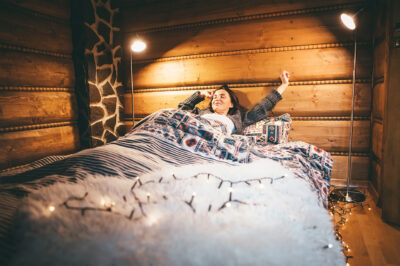
Shorter, darker days are a hallmark of winter, and so is the tendency to want to catch more zzzs. We might really sleep more in the winter — but that doesn’t mean we actually need more sleep when it’s cold out. To find out what’s really going on with our altered sleep habits during the winter, we spoke with a certified sleep expert.
Do We Need More Sleep In The Winter?
Sleep needs for most adults are somewhere between seven and nine hours per night, and that’s likely consistent no matter how cold or dark it gets outside. Still, “according to data from the National Sleep Foundation, healthy adults tend to sleep 1.75 to 2.5 hours more during winter,” says Dr. Carleara Weiss, PhD, MS, RN, and sleep scientist. “Although the sleep need does not change during winter, environmental changes such as short days, early sunset, and cold temperatures tend to make people more tired and sleepy.”
Why We Sleep More In The Winter
While we might not physically need more sleep in the winter, those environmental changes, among other causes, mean we may end up spending more time snoozing.
- Shorter days, earlier sunsets, and colder temperatures. “These environmental changes affect the circadian rhythm because it is synchronized with the light in the environment,” explains Weiss. “Early sunsets and short days can be draining as they may prompt an earlier rise in the natural production of melatonin.” Colder temperatures can also boost our metabolism, which likely increases our need for both food and sleep.
- Less sun exposure. Less sunshine means a reduction in vitamin D synthesis from our skin. “Reduced levels of vitamin D have been linked to excessive daytime sleepiness and fatigue,” says Weiss. But that’s not all. “Stress, anxiety, and depression have been linked to low vitamin D levels.”
- Holiday stress. Most people experience a lot of pressure inherent to the holidays, from hosting gatherings to spending money on presents to pulling out all the stops to make the season as magical as possible. Add alcohol and more indulgence in a wider variety of foods, including plenty of treats, and you’ll likely find yourself feeling much more run down than usual. If you’re skipping your workouts to check off all the things on your holiday to-do list, that may have an impact on your sleep too.
- Seasonal affective disorder (SAD). This type of depression is linked to seasonal changes, often in the autumn and winter. It can interfere with your ability to sleep well at night, creating excessive levels of sleepiness during the day. Other symptoms may include mood changes, a deep sense of sadness, withdrawal, and low energy, all of which can make you more likely to retreat to sleep. If you’re experiencing these sorts of symptoms, speak with your doctor about treatment options.
A Word On Napping In The Winter
Less sunlight may not just make you want to head to bed earlier — it may have you dozing off in the afternoon, or at least fighting to stay focused. You can likely chalk that up to shorter days with dark mornings and equally dark evenings, cold temperatures, and an uptick in melatonin production that begins earlier than usual.
How To Wake Up In The Winter
While there are a lot of reasons you may want to stay curled up in bed during the winter, you don’t automatically need more sleep this time of year. And with a little effort, you can combat the urge to snooze. “We can adjust to functioning well during winter by exercising, keeping a consistent schedule, and exposing ourselves to the light in the morning,” says Weiss.
If the challenge is actually getting out of bed on those cold, dark mornings, there are a few workarounds worth trying. Mimic dawn with a sunrise alarm clock, set the heater to come on 15 minutes before the alarm, and give yourself a specific reason to get out of bed. A morning workout is a great option — it’ll get you out of bed, and consistent exercise may help keep your energy levels high.
The Last Word From Sleepopolis
If you think you’re sleeping more in the winter, you’re probably right. But it’s not because these colder, darker days mean you physically need more sleep. We sleep more in the winter because shorter days mean less sunlight, which can affect our circadian rhythm. If your desire for more sleep is becoming an issue, remember that regular exercise, sticking to a consistent bedtime and wake-up time, and making a point of exposing yourself to light first thing in the morning might help.



























